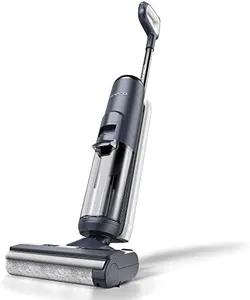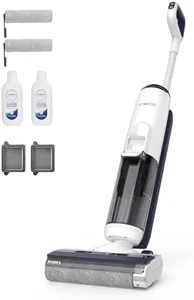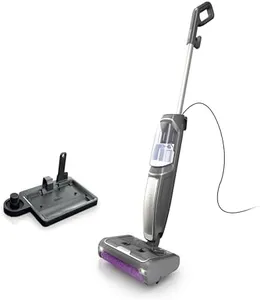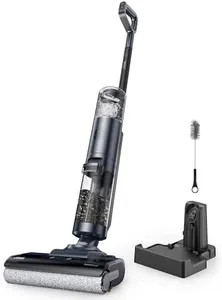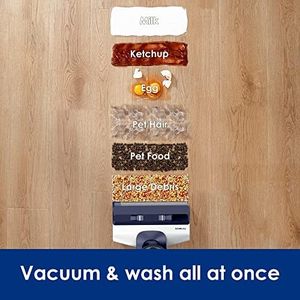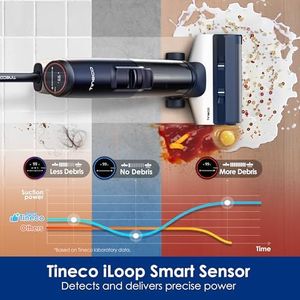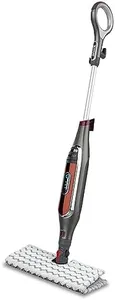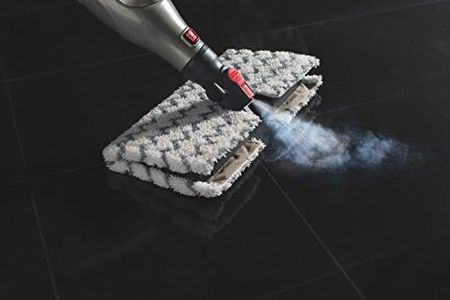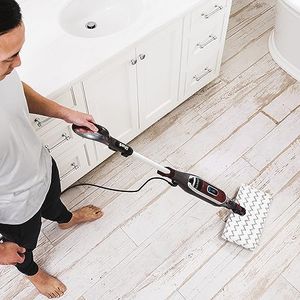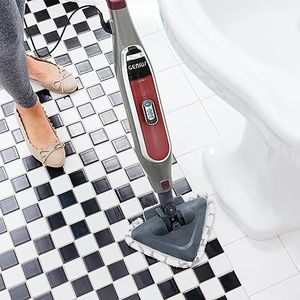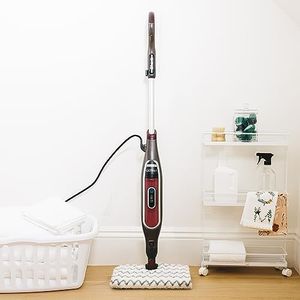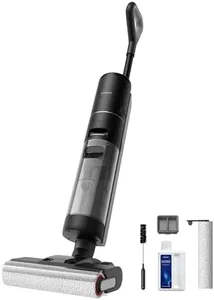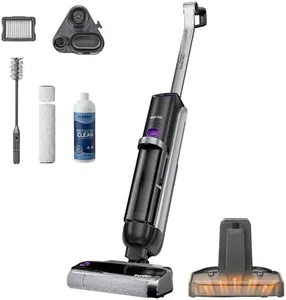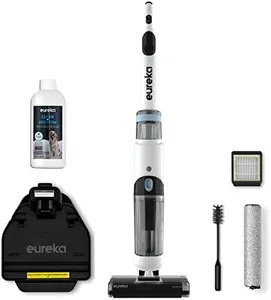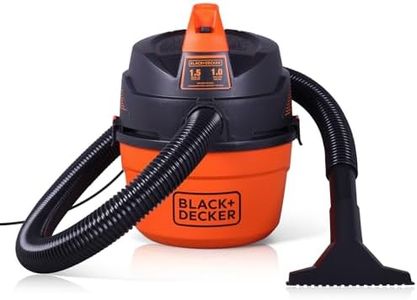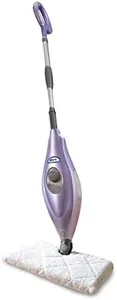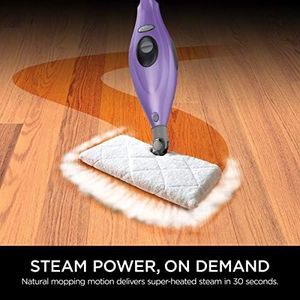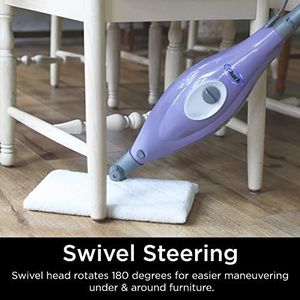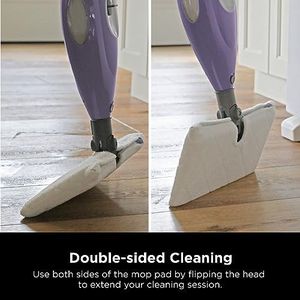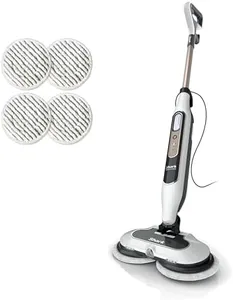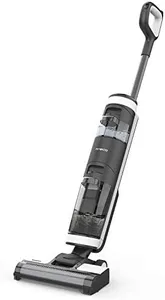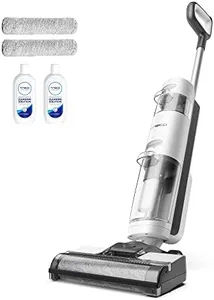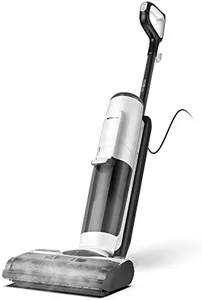10 Best Hardwood Floor Cleaner Machine 2025 in the United States
Winner
Tineco Floor ONE S5 Smart Cordless Wet Dry Vacuum Cleaner and Mop for Hard Floors, Digital Display, Long Run Time, Great for Sticky Messes and Pet Hair, Space-Saving Design, Blue
The Tineco Floor ONE S5 is a versatile cordless cleaner designed for hardwood floors, combining vacuuming and mopping functions. It’s especially good at handling both wet and dry messes, including sticky spills and pet hair, thanks to its iLoop Smart Sensor Technology which adjusts suction and water flow automatically. This makes it quite convenient for everyday use. The enlarged water tank (0.8 liters) allows you to clean larger areas without frequent refills, while the dual-tank system ensures you're always using clean water for mopping.
Most important from
7242 reviews
Tineco iFLOOR 5 Breeze Complete Wet Dry Vacuum Cordless Floor Washer, One-Step Cleaning for Hard Floors, Edge Clean, Auto Self-Cleaning, Lightweight & Cordless Design
The Tineco iFLOOR 5 Breeze Complete is a versatile hardwood floor cleaner designed to simplify your cleaning routine. One of its standout features is the ability to vacuum and mop simultaneously, which can save you time and effort. This makes it particularly appealing for those with sealed hard floors like hardwood, tile, or laminate, as it can handle both wet and dry messes efficiently. The innovative flat scraper and dual-tank system ensure you’re always using clean water while keeping the brush roller fresh, leading to cleaner floors without streaks.
Most important from
7242 reviews
Shark Steam Pickup 3-in-1 Steam Mop Picks Up Debris, Deep Scrubs, & Steam Sanitizes - All At Once, Lightweight Steam Cleaner for Home with Sealed Hard Floors like Hardwood, Tile & Laminate, SD201
The Shark Steam Pickup 3-in-1 Steam Mop is designed to offer a comprehensive cleaning solution for sealed hard floors like hardwood, tile, and laminate. Its standout feature is the 3-in-1 cleaning mechanism, which picks up debris, scrubs, and sanitizes all in one step, making it highly efficient and time-saving.
Most important from
8215 reviews
Top 10 Best Hardwood Floor Cleaner Machine 2025 in the United States
Winner
9.8 score
Tineco Floor ONE S5 Smart Cordless Wet Dry Vacuum Cleaner and Mop for Hard Floors, Digital Display, Long Run Time, Great for Sticky Messes and Pet Hair, Space-Saving Design, Blue
Tineco Floor ONE S5 Smart Cordless Wet Dry Vacuum Cleaner and Mop for Hard Floors, Digital Display, Long Run Time, Great for Sticky Messes and Pet Hair, Space-Saving Design, Blue
Chosen by 1225 this week
Tineco iFLOOR 5 Breeze Complete Wet Dry Vacuum Cordless Floor Washer, One-Step Cleaning for Hard Floors, Edge Clean, Auto Self-Cleaning, Lightweight & Cordless Design
Tineco iFLOOR 5 Breeze Complete Wet Dry Vacuum Cordless Floor Washer, One-Step Cleaning for Hard Floors, Edge Clean, Auto Self-Cleaning, Lightweight & Cordless Design
Shark Steam Pickup 3-in-1 Steam Mop Picks Up Debris, Deep Scrubs, & Steam Sanitizes - All At Once, Lightweight Steam Cleaner for Home with Sealed Hard Floors like Hardwood, Tile & Laminate, SD201
Shark Steam Pickup 3-in-1 Steam Mop Picks Up Debris, Deep Scrubs, & Steam Sanitizes - All At Once, Lightweight Steam Cleaner for Home with Sealed Hard Floors like Hardwood, Tile & Laminate, SD201
Shark S5003D Genius Hard Floor Cleaning System Pocket Steam Mop, Burgundy/Gray
Shark S5003D Genius Hard Floor Cleaning System Pocket Steam Mop, Burgundy/Gray
DREAME H12 PRO Wet Dry Vacuum Cleaner, Cordless Vacuum Mop All in One, Smart Floor Cleaner for Hard Floor, One-Step Edge to Edge Cleaning with Hot Air Drying
DREAME H12 PRO Wet Dry Vacuum Cleaner, Cordless Vacuum Mop All in One, Smart Floor Cleaner for Hard Floor, One-Step Edge to Edge Cleaning with Hot Air Drying
Shark S3501 Steam Pocket Mop Hard Floor Cleaner, With Rectangle Head and 2 Washable Pads, Easy Maneuvering, Quick Drying, Soft-Grip Handle and Powerful Steam, Purple
Shark S3501 Steam Pocket Mop Hard Floor Cleaner, With Rectangle Head and 2 Washable Pads, Easy Maneuvering, Quick Drying, Soft-Grip Handle and Powerful Steam, Purple
Shark Steam & Scrub with Steam Blaster Technology All-in-One Hard Floor Steam Mop with 3 Steam Modes & LED Headlights S8201
Shark Steam & Scrub with Steam Blaster Technology All-in-One Hard Floor Steam Mop with 3 Steam Modes & LED Headlights S8201
Tineco Floor ONE S3 Cordless Hardwood Floors Cleaner, Lightweight Wet Dry Vacuum Cleaners for Multi-Surface Cleaning with Smart Control System
Tineco Floor ONE S3 Cordless Hardwood Floors Cleaner, Lightweight Wet Dry Vacuum Cleaners for Multi-Surface Cleaning with Smart Control System
Tineco iFLOOR 3 Breeze Complete Wet Dry Vacuum Cordless Floor Cleaner and Mop One-Step Cleaning for Hard Floors
Tineco iFLOOR 3 Breeze Complete Wet Dry Vacuum Cordless Floor Cleaner and Mop One-Step Cleaning for Hard Floors
7.4 score
Tineco FLOOR ONE S5 Steam Corded Wet Dry Vacuum All-in-one, Hardwood Floor Cleaner Great for Sticky Messes, Smart Steam Mop for Hard Floors with Digital Display and Long Run Time
Tineco FLOOR ONE S5 Steam Corded Wet Dry Vacuum All-in-one, Hardwood Floor Cleaner Great for Sticky Messes, Smart Steam Mop for Hard Floors with Digital Display and Long Run Time
Our technology thoroughly searches through the online shopping world, reviewing hundreds of sites. We then process and analyze this information, updating in real-time to bring you the latest top-rated products. This way, you always get the best and most current options available.

